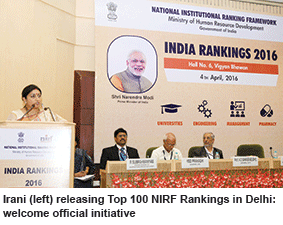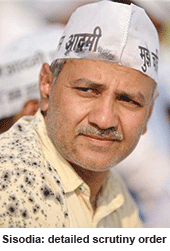 The first official (union hrd ministry) league tables ranking the Top 100 category ‘A’ Indian universities, engineering colleges and B-schools were released in New Delhi on April 4.
The first official (union hrd ministry) league tables ranking the Top 100 category ‘A’ Indian universities, engineering colleges and B-schools were released in New Delhi on April 4.
Based on a National Institutional Ranking Framework (NIRF) devised by a 16-member “core committee” of academics constituted by the Union human resource development ministry in October 2014, the first-ever government league tables evaluated category ‘A’ higher education institutions on six parameters, viz, teaching, learning and resources; research and professional practices; graduation outcomes; outreach and inclusivity; perception.
Although HRD ministry sources claim that the NIRF framework, based mainly on hard data plus perception, is superior to the overwhelmingly perception-based surveys of media publications (including EducationWorld), the ministry’s first official rankings are less than credible.
In the universities league table, while the #1 rank is predictably awarded to the Indian Institute of Science, Bangalore and is in line with most media surveys, the ranking of Tezpur University (#4) above Delhi U has invited derision. Ditto the rankings of Aligarh University (#10) and Viswa Bharati, Kolkata (sic) at #11. Moreover, the Indian Institute of Foreign Trade (IIFT), a centre of excellence under the Union ministry of commerce and industry but not a university, has been ranked #81. Consequently, there’s been a war of letters between the two ministries.
While compiling the engineering and B-school league tables, the NIRF rankings have played it safe by ranking all IITs headed by IIT-Madras, and the IIMs headed by IIM-Bangalore, among the Top 10. However the #19 rank of the Indian Institute of Technology-Mandi above the College of Engineering, Pune (estb.1848) and PSG College of Technology, Coimbatore has aroused widespread criticism. Ditto in the B-schools league table, the #15 rank of Thiagarajar School of Management, Madurai, above the transnational S.P. Jain Institute of Management & Research (#16), Mumbai and Vellore Institute of Management (#17) has raised eyebrows among informed monitors of Indian higher education.
Responding to widespread criticism of its inaugural ranking, the HRD ministry constituted a nine-member committee under the chairmanship of higher education secretary, V.S. Oberoi, on April 25. According to HRD ministry sources, the new committee will review the ranking methodology, rationalise the parameters, and establish a permanent NIRF cell within the NBA (National Board of Accreditation).
The ready willingness of Union HRD minister Smriti Irani to admit mistakes and constitute a review committee, has impressed some monitors of higher education. “The HRD ministry’s idea to establish NIRF league tables is a positive step in the right direction. Admittedly, it will take some more time before NIRF rankings match the credibility of Shanghai Jiao Tong or QS. Yet this is a welcome initiative towards putting order into the totally confused and muddled rankings systems prevalent in India so far,” says Dr. Yaj Medury, vice chancellor of Bennett University and former chairman & managing director of EdCIL (a government of India enterprise under the HRD ministry offering consultancy and technical services in education).
Likewise, Delhi’s academic community has welcomed the HRD ministry’s initiative to rate and rank India’s higher education institutions for several reasons. Firstly, after decades of resisting the idea of comparative league tables, it has finally accepted that comparisons are not odious, but necessary to spur laidback academics to improve institutional administration, processes, research and learning outcomes. Secondly, it has included its uniquely indigenous parameter of inclusivity and outreach (reservation and subsidies) in the evaluation parameters, an inclusion which distinguishes it from the league tables of the London-based QS and THE.
Now the major challenge of the HRD ministry is to make its NIRF league tables credible.
Autar Nehru (Delhi)
Populism burden
Although managing a private education institution is a legitimate “occupation” and recognised as such by the Supreme Court, six decades of neta-babu socialism has reduced the ease of providing education to almost nil.
By a notification dated April 17, the directorate of education (DoE) under the education ministry of the Aam Aadmi Party (AAP) government of Delhi state, has directed 1,800 private unaided schools in the national capital to submit detailed proposals justifying tuition fee increases, if any, for the new academic year starting June. The documents required before May 7 include “details of receipts and payment account, income and expenditure account, balance sheet for the last three years, i.e, 2013, 2014, 2015 along with budget estimates for the ensuing year, statement of salary disbursed to staff, and detail of all funds — reserve, general and gratuity”.
Fee enhancement proposals have to be submitted on DoE’s website by the said date following which they will be scrutinised by officials. “In case no proposal is submitted by a school, it shall not increase the fee and any increased fee already charged shall be refunded/adjusted by it,” said Saumya Gupta, director of education, in the notification addressed to private schools.
The April 17 government order comes after 250 parents complained to education and deputy chief minister, Manish Sisodia, about tuition fee increases ranging from 20-55 percent in three schools — G.D. Salwan Public School (Rajinder Nagar), Delhi Public School, Rohini and DPS, Mathura Road.
The schools were warned of action under s.17(3) of the Delhi School Education Act and Rules, 1973. This section of the Act is applicable to schools allotted land by the Delhi Development Authority (DDA) at concessional rates at the time of promotion. While these schools rolled back their fee hikes, the government’s blanket move directing all schools to submit fee structure details when the admission process is nearing closure, has irked promoters and managements of private schools in Delhi.
“Only 300 of Delhi’s private unaided schools have been allotted land by DDA. Instead, the DoE is misleading the public by implying that all private schools have benefited from concessional land grants. The apex as well as several high courts have given us full freedom in administrative matters. Clearly, by ordering a diktat to all private schools, the state government chooses not to pay heed to any judicial precedents and continues to target private schools to curry favour with the public,” says S.K. Bhattacharya, president, Action Committee for Unaided Recognised Private Schools, an umbrella organisation (estb.1997) of six associations of private schools in Delhi.
According to private unaided school promoters/managements, chief minister Arvind Kejriwal believes that freezing private school fees in the national capital will win AAP — which is all set to make an electoral debut in the Punjab legislature election scheduled for March 2017 — huge electoral dividends. Last December, he introduced two Bills — the Delhi School (Verification of Accounts and Refund of Excess Fee) Bill, 2015 and Delhi School Education Act and Rules 1973 (Amendment) Bill, 2015 — to regulate tuition fees, admissions process and pay scales of teachers in private independent schools. These bills are currently awaiting approval of the President.
The persistence with which the year-old AAP government interferes with private unaided schools, even as 900-plus government schools in Delhi are in a state of utter neglect, has even put off lawyer-activist and founder-president of Social Jurist, Ashok Agarwal, who has been a stern monitor of the alleged excesses of private/independent schools.
“The only solution to this recurring problem is upgrading government schools to offer competitive quality education. In its absence, the debate over fees for facilities will continue. Private schools will continue to overcharge, claiming improved facilities. This will result in endless litigation between government and private schools,” says Agarwal.
This is well-meant advice from a self-confessed communist which the populist AAP government should heed. Instead of focusing on the tuition fees, admin processes and other perceived misdemeanours of private independent schools, Kejriwal & Co should improve free-of-charge government schools and put private schools out of business.
Swati Roy (Delhi)